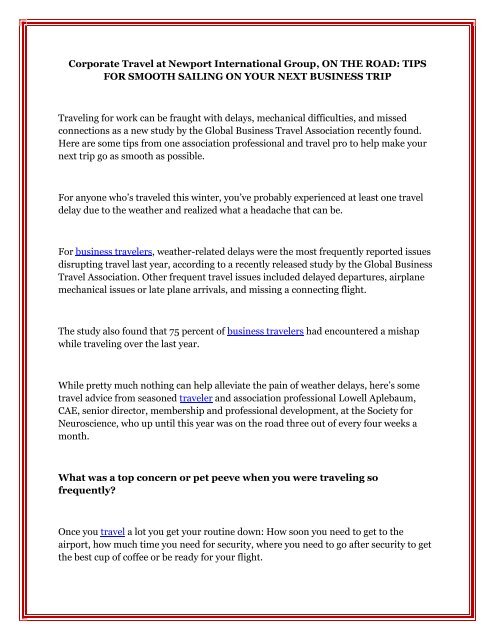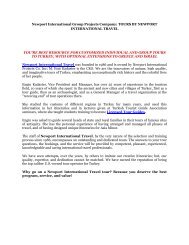ON THE ROAD: TIPS FOR SMOOTH SAILING ON YOUR NEXT BUSINESS TRIP
Create successful ePaper yourself
Turn your PDF publications into a flip-book with our unique Google optimized e-Paper software.
Corporate Travel at Newport International Group, <strong>ON</strong> <strong>THE</strong> <strong>ROAD</strong>: <strong>TIPS</strong><br />
<strong>FOR</strong> <strong>SMOOTH</strong> <strong>SAILING</strong> <strong>ON</strong> <strong>YOUR</strong> <strong>NEXT</strong> <strong>BUSINESS</strong> <strong>TRIP</strong><br />
Traveling for work can be fraught with delays, mechanical difficulties, and missed<br />
connections as a new study by the Global Business Travel Association recently found.<br />
Here are some tips from one association professional and travel pro to help make your<br />
next trip go as smooth as possible.<br />
For anyone who’s traveled this winter, you’ve probably experienced at least one travel<br />
delay due to the weather and realized what a headache that can be.<br />
For business travelers, weather-related delays were the most frequently reported issues<br />
disrupting travel last year, according to a recently released study by the Global Business<br />
Travel Association. Other frequent travel issues included delayed departures, airplane<br />
mechanical issues or late plane arrivals, and missing a connecting flight.<br />
The study also found that 75 percent of business travelers had encountered a mishap<br />
while traveling over the last year.<br />
While pretty much nothing can help alleviate the pain of weather delays, here’s some<br />
travel advice from seasoned traveler and association professional Lowell Aplebaum,<br />
CAE, senior director, membership and professional development, at the Society for<br />
Neuroscience, who up until this year was on the road three out of every four weeks a<br />
month.<br />
What was a top concern or pet peeve when you were traveling so<br />
frequently?<br />
Once you travel a lot you get your routine down: How soon you need to get to the<br />
airport, how much time you need for security, where you need to go after security to get<br />
the best cup of coffee or be ready for your flight.
I’d say a pet peeve would be anything that happens that messes up that routine. It could<br />
be people who are in the wrong line for security, people who still don’t realize you need<br />
to show ID to check in, any of the small things you know are going to mess up your usual<br />
pattern.<br />
Just like when people go to the office in the morning and they have their routine—they<br />
like to set up their computer, get their cup of coffee, check the news—it’s the same for a<br />
traveler.<br />
What time of day or days of the week did you prefer to travel?<br />
In terms of when to travel, my philosophy is I want to be away from home as little as<br />
possible, so I’d rather get the 5 a.m. flight and get there and have a full day to work in<br />
hopes that when it comes time to leave I don’t have to stay the extra day or the extra<br />
night because I’ve spent the whole day working.<br />
But if you get the 5 a.m. or 6 a.m. flight that means you’re up at 3 a.m. in time to get<br />
there, so I’m not saying that’s for everyone. There’s give and take and wear and tear on<br />
your body, and are you going to be awake and vibrant when you get to your first<br />
meeting?<br />
I happen to be a morning person so it works for me, but I’d much rather do the early<br />
morning flight and get the full day in than leave at noon and try to start meetings at four<br />
or five in the evening.<br />
What about choosing a hotel?<br />
I think my advice would be location, location, location. People have brand loyalty and<br />
earning points and perks will definitely make your hotel experience better. But, in
general, if you know where you have to be for a conference, staying five, 10 minutes<br />
farther away to save 10 or 20 bucks isn’t worth it.<br />
When you’re traveling, your hotel room is your home base. It’s the place you have that<br />
you can work. It’s the place you have that is quiet. It’s the place you have that you have<br />
all your stuff organized and you can lay everything out and no one’s going to touch it.<br />
You don’t have an office. You don’t have a home. But you have the hotel room. … It’s<br />
worth the investment to be close to that home base.<br />
What advice would you give a newbie business traveler?<br />
You quickly learn that the perks of loyalty programs—whether it’s boarding first and<br />
getting your bag on the plane, or having access to a lounge that has breakfast in the<br />
morning—whatever the perks may be, for business travelers who are on the road all the<br />
time, they become part of what helps you do your job better.<br />
If you travel a lot, being able to board first so you can take your bag [and not run out of<br />
space on the plane to store it], means that much less time that you’re waiting at baggage<br />
claim so you can go and get to your meeting. The lounge in the hotel in the morning,<br />
which may seem first class, is really a quiet place you can go, spread out, and do some<br />
work before your meetings.<br />
Any other advice?<br />
Any day that you are traveling somewhere new, even if you’re booked from 8 a.m. till 10<br />
p.m., you’re still somewhere different, you’re still somewhere new, there’s always the<br />
possibility to try and get a little bit of the local flavor, whether that’s the food, the people<br />
you talk to, or maybe there’s a beautiful outdoor environment you can go out and<br />
appreciate.
Yes, business travel is business first and travel second, but it shouldn’t mean that you<br />
don’t pay attention to where you are and try to experience a little of where you are even<br />
though it may not be the primary reason you are there.




